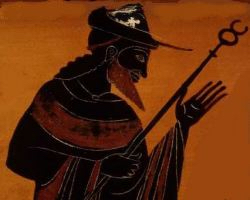Due
Date: Wednesday December 7, 11:59 PM.
Description: A 1000 word (minimum) essay about Ovid and
mythology. (Use standard
manuscript format, e.g. double-spaced lines, 1 inch
margins, 10-12 pt. font, etc. Remember: when double-spacing, do not put extra space after a paragraph
break, or allow your word processor to do so. Yes, I
take points off for this.)
Technical Details:
Submit it to me via Canvas on December 7 (or sooner: the
assignment will go live in the Monday before it's due).
Don't email me the essay, or send it to me via carrier
pigeon, or Pony Express etc.
Necessary Elements: You need to argue some position
that connects Ovid and his book to mythology and/or to Greek
and Roman culture generally. You do not need to do research
for this essay, and I don't encourage you to do so (as odd
as that may sound). (The trouble is, what many people mean
by "research" is "Google something instead of reading the
assignments". A real research project should be made of
sterner stuff, and this class isn't set up to support it.)
Your grade will depend on how well you understand Ovid and
the myths we've studied in this course (and how well you
show me that you do). You don't need a bibliography for the
paper, but if you cite or quote anything except for Tatlock
or Lombardo's translation of Ovid, you should tell me where
the words come from (specifically). When you quote Ovid, it
should be from Lombardo's translation; if you quote a
general book on classical mythology, it should be Tatlock's
text unless you're contrasting Tatlock with someone else;
e.g: "Tatlock (p. 22) says Walrusius has red tusks, but in Cal's
Complete Compendium of Classical Myths (p. 729) it
says that he had green ones").
Don't use outside sources unless absolutely necessary, and
always clear it with me first, and I'll probably say no.
Remember, this is a paper about Ovid's Metamorphoses:
that's all you should need to write your paper. I'll also
ding your grade for bad info from a bad source so a.) don't
use an outside source unless you need one, and b.) check it
with me before you write your essay.
This Is A Big Deal, So Read This: Cite the source of
anything you quote or paraphrase, and always cite as
specifically as possible. For a modern book (e.g. Tatlock)
this means page numbers. For an epic (like Ovid) this means
book and line numbers. .
Topics: I don't want to limit you but among the
things you could discuss are: whether Ovid believes in the
religion that generated his mythology; whether the book is
meant to praise Augustus and his family or satirize them;
whether Ovid changes Greek myths for the benefit of his
Roman audience (or vice versa); whether the gods in Ovid's
epic are jerks or not (and why); what the nature of heroism
is in Ovid's epic; which myths in Ovid were most interesting
and which were least; whether (or how) Ovid would change his
myths to appeal to a modern audience; whether Ovid's version
of mythology is immoral, amoral, or moral (and according to
whose morality); whether the visual components of the course
tell a fundamentally different version of myth than Ovid
does--and, if so, why; what impact Ovid had on later
tellings and retellings of mythology, especially in other
media; etc. Especially etc. Pick a topic you can write a few
detailed pages about. You can write more than 1000 words if
you want to, but don't write less.
BG Perspectives Stuff:


